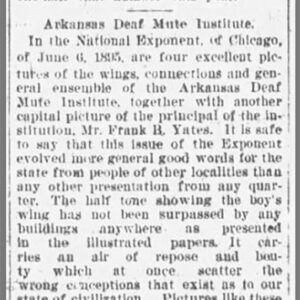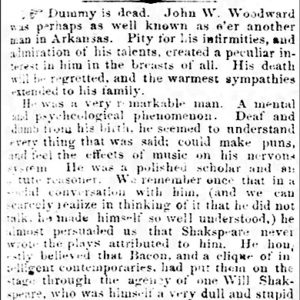calsfoundation@cals.org
John Wesley Woodward (1820–1865)
John Wesley Woodward was a pioneer in the education of deaf children in Arkansas as well as an influential newspaperman and state government figure who, most notably, oversaw the relocation of state records during the Civil War.
John Wesley Woodward was born on a Virginia plantation near Richmond to Dr. James Woodward and Virginia Woodward on April 20, 1820. He contracted scarlet fever at the age of three, causing him to lose his hearing. Around the age of ten, Woodward came under the care of an uncle, presumably because he was orphaned. Because few schools existed in the United States for the education of the deaf, Woodward’s uncle sent him to the world-famous Institut National de Jeunes Sourds de Paris in Paris, France, the oldest free educational institution for the deaf in the world. While there, Woodward learned to read and write at least two languages, possibly more. He became a proficient lip reader, and most who met him claimed that he was so skillful that they did not realize he could not hear.
Woodward returned to the United States sometime after finishing his schooling, arriving in Arkansas in 1845. Clarksville (Johnson County) resident and philanthropist Augustus Ward, who was the Johnson County clerk, contacted Woodward to ask him to travel to Johnson County to start a school in his home for deaf children. Ward had started a school for blind children with the Reverend James Champlin in 1849, and he now wanted to add instruction for deaf children. Woodward came to teach and serve as assistant to Ward. In 1850, Woodward was living in the Ward home. He met Virginia Cox, one of two orphaned sisters Ward had taken in several years prior. They married and had two children, Orianna in 1854 and Gus in 1857.
In 1851, Woodward started the first deaf/mute school in the state. In a Little Rock (Pulaski County) newspaper, Ward posted a notice saying, “The trustees of the Clarksville Institute have made arrangements to have a class of deaf mutes taught. The school of mutes will open on the 1st of May, tuition, gratis. Boarding can be had very reasonable. Only a limited number of pupils, six or eight will be taken.” Woodward taught the classes, while Ward worked to recruit students. The school had five pupils in the first year. Both men solicited funding from the Arkansas General Assembly. Although the legislature ultimately sent $300 to the school, the amount was not enough to keep the school open. Woodward, educated as he was at the free school in Paris, refused to charge tuition fees. (Several years later, state legislators funded a deaf school in Little Rock, with Virginia Woodward as its first matron. The boys’ honor society called itself the Woodward Club.)
While in Clarksville, Woodward became involved in the Arkansas Democratic Party. By 1852, although still an assistant county clerk, Woodward served as enrolling clerk of the Arkansas House of Representatives. Four years later, Woodward and his wife had moved to Little Rock, and he was working as co-editor of the True Democrat newspaper, which served as the voice of “The Family,” the powerful group of Democrats that then controlled much of Arkansas politics. He ran the paper solely when the other editor, Richard Johnson, was serving as state treasurer.
C. C. Danley, owner and editor of the Arkansas Gazette and member of the Know-Nothing Party, hated the True Democrat, the Family, and Woodward. Danley, for example, claimed that Woodward had prostituted his principles to work for the True Democrat, stating, “He is a spritely writer, of facile antecedents, uncertain status, elastic conscience, and marketable principles.”
Mississippian Thomas Hindman arrived in Helena (Phillips County) in 1854 to practice law and quickly became involved in Arkansas politics. He challenged the Know-Nothings in northern Arkansas and earned a U.S. Senate seat. A series of letters sent from “Viator” began to arrive at various newspapers across the state and were printed mainly in the papers of Hindman (who had split from the Family), praising him for his oratory abilities and exceptional ideas for the state’s prosperity. Woodward, and others, claimed that Viator was fictional and a ploy to make Hindman appear remarkable. Hindman, in response, claimed that Woodward wrote the notes as a trap or trick against the Old Line Democrats. Elias Boudinot, the editor of The Arkansian, defended Woodward, and eventually, the news broke that Hindman himself had written the letters.
Woodward was working on his next move for his through-the-mail chess match with Fayetteville (Washington County) judge David Walker when news arrived that the Civil War had broken out. When Arkansas seceded, state lawmakers created a new Arkansas constitution. Because of his penmanship and previous experience, the legislature chose Woodward as the scribe, and he penned the 1861 Arkansas State Constitution.
By May 1862, rumors swirled that Little Rock would fall to the advancing Union army. After much deliberation, Governor Henry Rector decided to send the state government records to Hot Springs (Garland County), his hometown. At that time, Woodward was serving as the chief clerk of the State Auditor’s Office, so Rector chose him as the leader for the removal of state and county records from the capital city.
Woodward obtained some lumber and oversaw the construction of several large packing crates for the records. Woodward had all of the records loaded onto a steamboat and underway within twenty-four hours of the governor’s order. After unloading in Dardanelle (Yell County), Woodward and his men traveled fifty miles through the Ouachita Mountains, a monumental task in 1862. After weeks of exhausting effort, most wagons arrived in Hot Springs. Woodward stashed some papers at the Planter’s Hotel while hiding some of the covered crates farther up the road. Later, in the fall of 1863, the new Arkansas governor, Harris Flanagin, tasked Woodward with moving the records on to the temporary state capital in Washington (Hempstead County).
In June 1863, a group of men created the State Historical Society of Arkansas in the office of the Arkansas Gazette. The idea of collecting military records and other wartime documents started a push for the organization. With C. C. Danley as the first president, Woodward served as one of the first vice presidents. The organization did not survive the war. However, Woodward did author an article on Colonel Matthew Lyon, a Spadra (Johnson County) resident.
Woodward also wrote hundreds of poems, but few survived. Woodward wrote under the pen name “Tototo” or “Tatotet.” His more famous poems include “The Legend of the Broken Sword,” “Virginia,” and “Freedom and Rights.” Woodward wrote “Virginia” as an ode to his native state and his mother. “The Legend of the Broken Sword” tells the story of Pedro and Hernando de Soto. “Freedom and Rights” is about the Civil War.
Woodward died on February 8, 1865. He was originally buried at Mount Holly Cemetery in Little Rock. In April 1924, a relative transported his body to Clarksville, where he is buried next to his wife in Oakland Cemetery. On November 5, 1936, the Centennial Commission of Arkansas placed a historical marker on the site of Arkansas’s first school for the deaf, where the Ward home stood on what is now the University of the Ozarks campus.
For additional information:
Allsopp, Fred W. The Poets and Poetry of Arkansas. Little Rock: Central Printing Company, 1933.
Baker, Russell P. “‘Dummy’ and the Documents: Saving the Constitutions in 1862.” Presentation at the Arkansas Historical Association annual conference, 2006.
Maxted, Mattie Cal. “Training of Deaf Children in Arkansas.” Arkansas Historical Quarterly 5 (Autumn 1946): 193–207.
Eno, Clara B. “Legends of Arkansas.” Arkansas Historical Quarterly 2 (March 1943): 33.
“John W. Woodward.” Probate Court Records, January 1867, Johnson County, Arkansas.
Langford, Ella Molloy. History of Johnson County: The First One Hundred Years. Clarksville, AR: Johnson County Historical Society, 1981.
Riggs, Bess Michaels. A Brief History of the Education of the Deaf in the State of Arkansas. Little Rock: School for the Deaf, 1934.
Ross, Margaret. Arkansas Gazette: The Early Years, 1819–1866. Little Rock: Arkansas Gazette Foundation, 1969.
Buckley T. Foster
University of Central Arkansas
 Education, Elementary and Secondary
Education, Elementary and Secondary Louisiana Purchase through Early Statehood, 1803 through 1860
Louisiana Purchase through Early Statehood, 1803 through 1860 Politics and Government
Politics and Government Deaf Mute Institute Story
Deaf Mute Institute Story  Woodward Death Story
Woodward Death Story 




Comments
No comments on this entry yet.